Memoirs & Diaries - The Flood at Suvla Bay
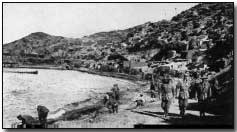 If you broke a wash-basin
in half, the line of the break would give you a good idea of the trench
lines at Suvla.
If you broke a wash-basin
in half, the line of the break would give you a good idea of the trench
lines at Suvla.
High, almost mountain-high, to the north, they ran down the stony slopes, where nothing grew but prickly Turkish holm-oak in dense, scrubby patches, down to the cultivated flat land at the bottom of the basin.
Over grassy hillocks they ran, and away southwards to the Anzac position, which we saw dimly, but did not know, and up the distant cliffs to the precarious foot-hold we had on the summit there. From 70 to 400 yards apart they ran, our trench and the Turkish line.
Standing in the middle of the basin, we saw a curved line of hills some miles away. To the left these hills went on behind us to the northern end of the blue bay, where the battleships rode snugly at anchor inside protecting nets.
The ground here was like a rough farm at home. There were hedges and ditches, trees, some poor olive-groves, and here and there a vineyard.
All the ravines and water-courses on the distant hills led the winter rainfall into the middle of the basin, and in August we found in the clayey soil hoof-marks and foot-marks inches deep, made in the previous winter, when the farms were a puddle, and the farmers were at peace, and now baked and set till the rains should come again.
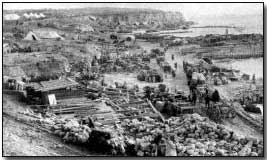 Our
division held the middle of the basin. My battalion was on the left
flank of the divisional sector, and my left-hand company was on rising
ground, where the slope of the northern hills began.
Our
division held the middle of the basin. My battalion was on the left
flank of the divisional sector, and my left-hand company was on rising
ground, where the slope of the northern hills began.
The battalion trenches were shaped like a bent bow with an arrow on it.
The front trench was the string, about three-quarters of a mile long. From each end a communication trench led back. These curved towards each other and met some 300 yards behind the firing-line.
They formed the bow. The arrow was a third trench, which was really a field ditch dug out and widened, and which ran from the middle of the front line to the junction of the two communication trenches. Battalion headquarters were just off this straight trench on the south side.
A trench with a fire-step led to them, and from this ran several narrow slits in the ground 2 feet wide and 6 feet deep. Each of these opened out into a small room, about 6 feet by 7, in which an officer or some men lived. One room was a good deal larger than the others. This was the mess-room.
These rooms were covered with corrugated iron and a few inches of earth, and in them lived four or five officers and about twenty men, runners, signallers, and the like.
It was a Friday in the last week of November 1915. I had been out for some hours with the Brigadier and the other C.O.'s, walking over the line of the trench which was being dug close to the beach to cover the evacuation, which we knew was coming.
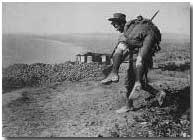 Heavy
rain had fallen all day, and I was very wet. When I got back to my
little room in the earth I changed, putting on dry "slacks" and shoes, a
British warm overcoat, and a Balaclava helmet, for it was cold.
Heavy
rain had fallen all day, and I was very wet. When I got back to my
little room in the earth I changed, putting on dry "slacks" and shoes, a
British warm overcoat, and a Balaclava helmet, for it was cold.
The time was now about six o'clock, and it was quite dark.
So I walked down my private slit and turned into the mess-room, where we had a lamp. Here the second-in-command, the M.O., and the adjutant were sitting on seats made of filled sand-bags, at a rough table made of rum cases.
The Adjutant told me nothing had happened, and we all cursed the weather, for the floor was muddy and the roof was dripping. There was an hour before dinner, and we began to discuss the evacuation, some details of which I had learnt during the afternoon.
As we sat talking there were noises of splashing in the slit outside, and the figure of an orderly was dimly seen, saluting with difficulty in the restricted space.
"Front line all correct, sir," he said.
"Very good," said the adjutant, and looked at me.
"All right, Jones, no messages," I said, and the splashing sound faded away up the slit. This was the usual procedure during the hours of darkness. Each company reported to battalion headquarters every hour, and we reported to the brigade.
The rain sounded more heavily than ever, and there were by now some 3 inches of water on the floor. To keep our feet dry we took the top row of sand-bags from the seats, and used them as foot-stools. Hopes of a meal seemed rather dim. The cook-house was not likely to be drier than the mess-room, and it would be no joke carrying things along the slit.
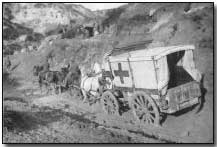 Even as the M.O. gave voice
to this thought there was more splashing, and the adjutant's servant
appeared, a waterproof sheet over his head.
Even as the M.O. gave voice
to this thought there was more splashing, and the adjutant's servant
appeared, a waterproof sheet over his head.
"Sorry dinner will be a bit late, sir," he said. "Cook's doing 'is best, but it's raining something awful, and keeps a-puttin' the Primus out."
"All right, Smith," said the M.O., who was Mess President on the grounds that he had less to do than anyone else. "Tell him not to worry. We'd sooner have it late and dry," and Smith paddled away.
Another unpleasant quarter of an hour went by, and the water on the floor rose slowly but steadily. Then, almost suddenly, the heavy drumming noise became less heavy, died down to a mere patter, and ceased. The M.O., who had on gum-boots, splashed outside and sniffed.
"It's stopped, sir," he said; "I can see a star or two."
"Thank Heaven!" I replied. "If that's so I'll just wade round to my dug-out and see how much of my kit is dry. I'm afraid I didn't cover up my valise."
It was very unpleasant in the slit. The water was over my shoes, and it was pitch dark. Gradually I began to see a little, and by the time I reached my dug-out had picked out several stars to the north.
My dug-out was furnished simply. There was a stretcher resting on filled sand-bags, and a packing-case in the corner. My valise went on the stretcher, and my kit on or under this. I lit a candle and began to pile things on the valise. The cover was turned over, after all, so my flea bag was dry.
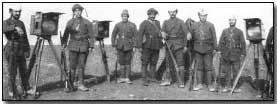 As I fished about
underneath for gum-boots I heard a strange sound. I could have sworn
it was the sea, washing on the beach! But the sea and the beach were
four miles away. I stood in the doorway and listened.
As I fished about
underneath for gum-boots I heard a strange sound. I could have sworn
it was the sea, washing on the beach! But the sea and the beach were
four miles away. I stood in the doorway and listened.
And as I listened in the flickering light there was a curious slapping noise in the slit outside, and a great snake of water came round the curve - breast high - and washed me backwards into the dug-out.
I was off my feet for a moment, and then, sodden and gasping, I was in the doorway again. Another moment and I was in the open air, and the horror of drowning under the dug-out roof was gone. What was left was bad enough! The water was at my throat, waves of it licked my face.
I reached both hands to the top of the walls, but I could get no hold there. My fingers tore through the mud. Slowly I forced my way along the slit. If I could get to the main headquarters trench I should be better off, for this, like all trenches that faced east, had a fire-step, a broad ledge some 2 feet higher than the trench bottom.
I do not know how long it was before I turned the last corner. But suddenly I felt that the slit was wider. I turned round and with great difficulty got one foot up. Thank God! there was the ledge.
A great heave and I was on it - another heave and scramble and I was on the top - panting and dripping - but out of the water, out of the greasy prison-walls of that horrible slit.
I stood there in the dark for a minute to get my breath. Then I called out, "Hullo, headquarters party, is anyone here?"
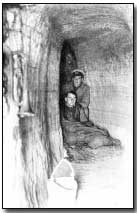 Answering voices came from
a few yards away, and, moving towards them, I found the M.O. and five or six
men standing by the hedge which ran along the centre communication trench.
They were all sodden and shivering, and the M.O. and one of the men were
clearly in a bad way - the others were supporting them.
Answering voices came from
a few yards away, and, moving towards them, I found the M.O. and five or six
men standing by the hedge which ran along the centre communication trench.
They were all sodden and shivering, and the M.O. and one of the men were
clearly in a bad way - the others were supporting them.
The ground was covered by the water - my feet told me that - and I realized that there was a flood from the hills, and that the water must have come through the Turkish lines. They were worse off than we were! But our lot was bad enough.
I could see the hedge clearly now, and the break in it where the trench I had just left opened into the centre trench. Taking two of the men with me, I walked carefully to the break, and turned along the headquarters trench, which, of course, I could not see for the flood water, calling out as I went.
Answers came from more than one point, and I heard the adjutant and the second-in-command. Moving on, I found they were on the top, each with two or three men, but separated from me and from each other by the small trenches that led to the dug-outs.
Gradually, going carefully hand in hand, and feeling with one foot ahead so that we might not step into a hidden trench, we came opposite them, and as one man had a stick which would reach across the slit, we were able to help them over in turn, and in the end we collected most of the party, though some were missing.
We moved cautiously back to the hedge, and in it or near it we spent the night. Most of us stood on the lower branches to keep out of the water. It was bitterly cold.
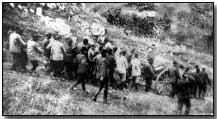 My
memories of that night are growing a little dim. One memory is of
shouting from the darkness beyond the hedge.
My
memories of that night are growing a little dim. One memory is of
shouting from the darkness beyond the hedge.
This came from the Captain of "C" Company - which was in the support line. He told me many of his men were drowned, and nearly all collapsed from cold, and he asked me what to do.
I told him to keep his men together and moving about while it was dark, but at the first sign of light to lie down behind the parados of the trench. His voice had a desperate sort of ring in it, which told me more than his words did. Other shouts were heard at intervals, and to those who came close enough the same orders were given.
During the night several of the men near me collapsed, and the M.O. seemed to be dying of cold.
With the first streaks of light came a young officer from "A" Company, which was on the right flank - and the lowest ground. He had managed to jump out of the trench when the flood came pouring over the parapet, and was dry, fit, and strong.
He had got a plank from somewhere and crossed the intervening trenches by means of it. And he came splashing along in the grey dawn with the plank on his shoulder. He had a dismal tale to tell of his own company. Many were drowned, others missing. He had left a few men behind the parados.
I told off the strongest of our party to salve two spades as soon as the water sank a little, and to dig a hole for the others to sit in-a shelter of some kind.
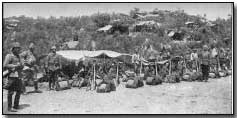 I
decided to try to get up the front trench with the young subaltern and his
plank.
I
decided to try to get up the front trench with the young subaltern and his
plank.
All the trenches were abrim and the water swirling along strongly. The torrent had eaten away the sides and each trench looked like a small river in spate.
We went up the hedge side. This gave us some cover from view, and also led straight to the front line. We crossed several trenches and ditches with some difficulty, and reached the front line in the middle of the sector.
No Man's Land was a lake. No attack would come over that for some time. North and south the front trench was full of sullen brown water, and behind it was no sign of life. Only here, where the hedge joined the front trench, were there any men.
Fifteen of them were there, with the company sergeant-major of "A", a very stout fellow, who had saved several from drowning, and was cheering them up as best he could. They were all blue with cold, shivering and wild-eyed.
"B" Company lines ran on to higher ground, so we turned north to find them. For some way the trench was full, and the muddy water hid its dark secrets. At the extreme end of our line the slope of the ground told, and here, behind an old stone wall, we found some twenty men and three officers.
They had got their machine gun in action, and I told the company commander that he must watch the whole front carefully, and be prepared to cover most of it. On our way back to Headquarters we saw a number of bodies of men who had obviously died of cold and exhaustion.
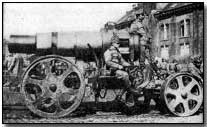 The men were digging when I
got back. Eight of them were taking turns with two spades, and they
had dug down about 4 feet in a square of 9 feet.
The men were digging when I
got back. Eight of them were taking turns with two spades, and they
had dug down about 4 feet in a square of 9 feet.
In this hole we existed for another forty-eight hours. In the afternoon two runners got up from the Brigade. Our orders were to hang on for the present, and I learnt that the whole front was disorganized, ration parties drowned, trenches impassable, and floods everywhere in the basin.
No rations came up in all that time. We found one tin of gooseberry jam and a rum jar half full of rum and muddy water. These were shared out among the party. We had nothing dry of any kind, no matches, tobacco, paper, clothes. That evening it began to freeze and the night was bitter. The M.O. died in his sleep, and two other men also.
Next day there was not more than 2 or 3 feet of water in the trenches, and we had about forty rifles in action as well as the machine gun, but all the men were exhausted. One Turk sniped at us from a tree, and hit several men before we got him.
It was quite impossible to get the wounded men away. Five other Turks struggled across No Man's Land (it took them an hour) and gave themselves up. Poor devils - they were half-dead already.
On the second day the brigadier waded up. He stood thigh deep in the trench to hear my gloomy report and went back with hardly a word. He had seen all that was necessary - and there was nothing to say. Moving about carefully on the top we found a number of bodies.
None was wounded, all had died of cold and exposure. Two brothers of "C" Company had died together. The arm of one was round the other's neck, the fingers held a piece of biscuit to the frozen mouth. It seemed a strange and inexplicable thing that these men who had come there to fight, and had fought bravely, had been killed by the elements.
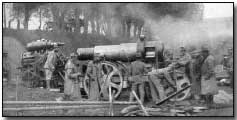 The
trenches were a foul sight. Everything was covered by a slimy scum of
mud.
The
trenches were a foul sight. Everything was covered by a slimy scum of
mud.
The front trench in the southern half was unspeakably horrible; this was where the flood had been deepest and strongest.
On the third day we were withdrawn. Forty-five of us all told crawled back to a ravine near brigade headquarters - many on hands and knees. Forty-five out of 500. The adjutant was killed on the way by shrapnel from a solitary shell.
In the ravine we camped under tarpaulins, and slept round a fire. They sent us up brandy and tinned chicken from the medical stores, and dry boots and clothes. On each of the succeeding days we stumbled up to the trenches to collect identity discs and to bury our dead.
Lieut.-Colonel F. W. D. Bendall was before the War captain, unattached list, Territorial Army.
1914, promoted Lieut.-Colonel to raise and command 2/3rd Battalion The London Regt. (Territorial Army). 1915, Malta; The Sudan; Gallipoli, Suvla Bay.
1916-1917, France, commanding 8th and 7th Battalions Middlesex Regt. Wounded August 1917, Battle of Passchendaele Ridge. 1918, Home service. Despatches (2) and C.M.G.
First published in Everyman at War (1930), edited by C. B. Purdom.
Photographs courtesy of Photos of the Great War website.
A "Dixie" (from the Hindi degci) was an army cooking pot.
- Did you know?
